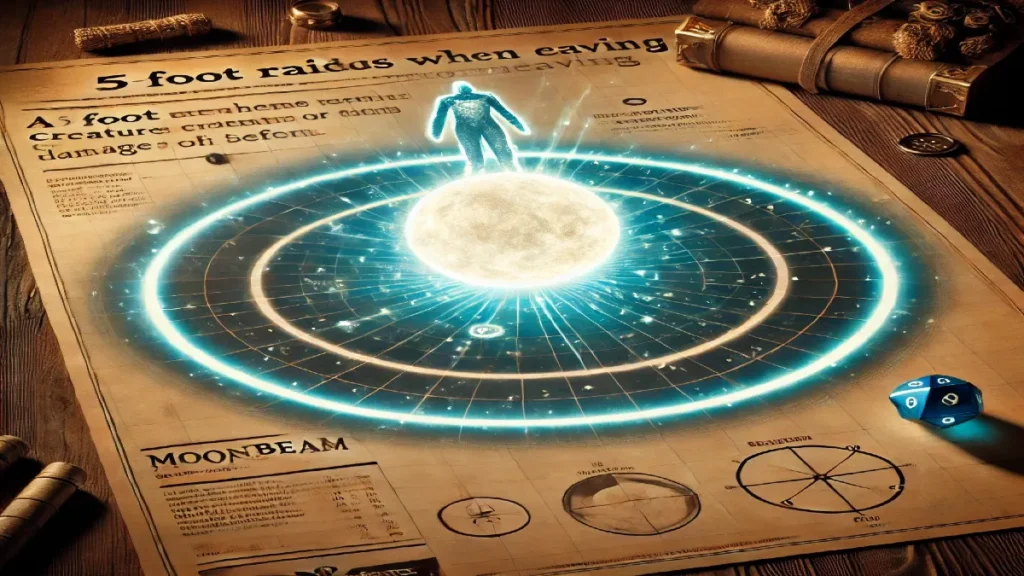1. Introduction: What is Moonbeam 5e?
Moonbeam is a powerful 2nd-level spell in Dungeons & Dragons 5e that harnesses divine radiant energy. It creates a 5-foot-wide column of light that deals radiant damage to creatures that enter or start their turn within its range. This spell is especially effective against shapeshifters, dealing extra damage and forcing them back into their original form.

2. Moonbeam 5e Spell Stats
| Spell Name | Moonbeam |
|---|---|
| Level | 2nd |
| School | Evocation |
| Casting Time | 1 Action |
| Range | 120 feet |
| Components | V, S, M (a bit of moonstone powder) |
| Duration | Concentration, up to 1 minute |
| Damage Type | Radiant |
| Saving Throw | Constitution (Half Damage) |
| Classes | Druid, Paladin (Oath of the Ancients) |
3. How Moonbeam Works in Combat
- Deals 2d10 radiant damage to creatures when they enter the area or start their turn in the beam.
- Shapeshifters revert to their original form if they fail the Constitution save.
- Can be moved 60 feet as an action each turn to reposition the beam.
- Damage increases by 1d10 per spell slot above 2nd level.
- Great for area control, forcing enemies to reposition or take continuous damage.
4. Best Uses for Moonbeam in D&D 5e
1. Shapeshifter Counter
Moonbeam forces shapechangers (e.g., werewolves, doppelgangers) back into their original form. This is critical for disrupting enemy plans.
2. Battlefield Control
By strategically placing Moonbeam, you can funnel enemies into difficult positions, forcing them to either take damage or move.
3. Dealing Consistent Damage
Since Moonbeam lasts up to 1 minute, it can deal massive damage over multiple rounds, unlike instant spells like Fireball.
4. Nighttime Ambushes
Moonbeam’s celestial glow is perfect for illuminating dark areas, revealing hidden enemies, or making an entrance more dramatic.
5. Pairing with Other Spells
- Entangle (Druid) + Moonbeam = Enemies can’t escape and take continuous damage.
- Wall of Force + Moonbeam = Trap enemies inside for guaranteed radiant damage.

5. Who Can Use Moonbeam?
| Class | Can Cast? |
|---|---|
| Druid | ✅ Yes |
| Paladin (Oath of the Ancients) | ✅ Yes |
| Cleric (Light Domain, Homebrew) | ❌ No (unless DM allows) |
| Sorcerer/Wizard/Warlock | ❌ No |
6. Pros & Cons of Moonbeam 5e
✅ Pros:
✔ High radiant damage (good against undead, fiends, and shapeshifters).
✔ Lasts up to 10 rounds (if you maintain concentration).
✔ Can be repositioned as an action each turn.
✔ Bypasses many resistances (radiant is one of the best damage types in D&D 5e).
❌ Cons:
✖ Requires concentration (can be disrupted if you take damage).
✖ Small area of effect (5-foot radius) compared to Fireball or Spirit Guardians.
✖ Needs good positioning to maximize effectiveness.
7. How to Maximize Moonbeam’s Effectiveness
- Use it against shapeshifters: Forces them out of their forms.
- Combo with movement-restricting spells: Hold enemies in the beam for multiple turns.
- Target low-Constitution enemies: Moonbeam deals full damage if they fail their save.
- Position it on enemy spellcasters: Distracts them and forces them to waste turns moving.
Also Read | https://bitcoinnewspro.com/gary-indiana/
8. Frequently Asked Questions (FAQ)
Q: Does Moonbeam hit on the turn it is cast?
A: No, it only deals damage when a creature starts its turn or enters the beam.
Q: Can I move Moonbeam?
A: Yes! As an action, you can move it 60 feet to reposition it.
Q: Does Moonbeam work indoors?
A: Yes, it doesn’t require real moonlight—it’s magical.
Q: Does Moonbeam affect allies?
A: Yes, so be careful where you place it!
Q: Is Moonbeam better than Fireball?
A: It depends! Fireball is burst damage, while Moonbeam is sustained damage and battlefield control.
9. Conclusion: Should You Use Moonbeam in D&D 5e?
Moonbeam is a versatile spell that shines in campaigns with shapeshifters, undead, and open battlefields. While it requires good positioning and concentration, it offers sustained damage and area denial, making it an excellent tool for Druids and Paladins.
Call to Action:
🔥 What’s your favorite way to use Moonbeam in D&D 5e? Drop your strategies in the comments below! 🚀
Want more D&D guides? Subscribe to our newsletter for the latest spells, builds, and strategies! 🐉✨



